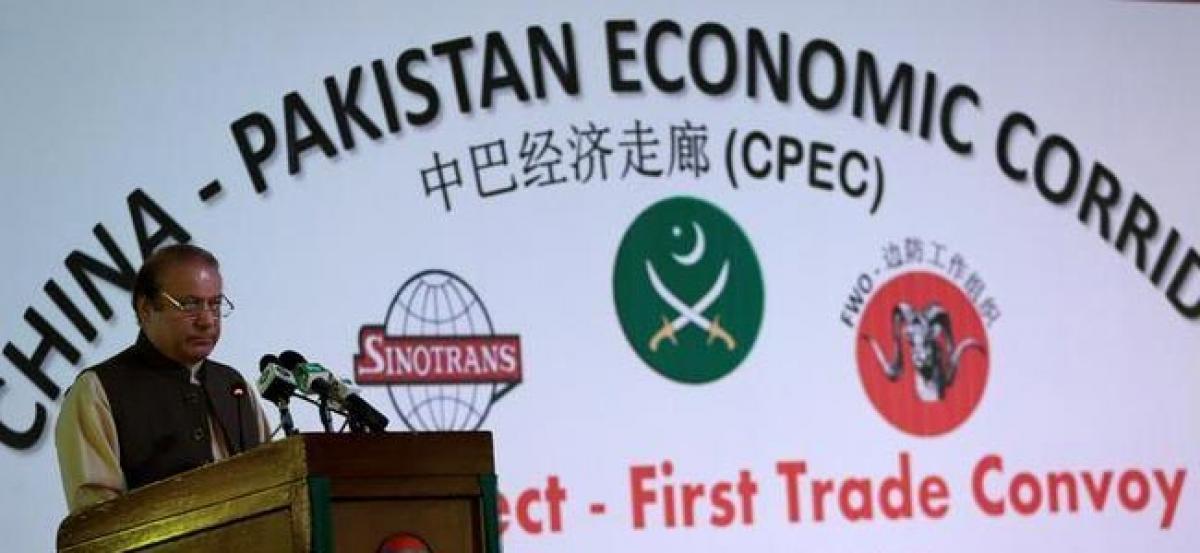Live
- Heavy rains cause disruptions in Tirumala and Tirupati
- Former Soldier Builds Temple for Rajinikanth, Installs New Idol on Superstar’s 74th Birthday
- Mohan Babu’s Daughter Manchu Lakshmi's Viral Post Sparks Controversy Amid Family Disputes
- NIST hosts alumni meet
- Upcoming Telugu OTT Releases: A Treat for Telugu Cinema Lovers in December
- Vedamrit Honey’ launched
- Arjun Das Brings Mufasa to Life in Tamil
- Odisha move to prepare maritime perspective plan
- Jal Jeevan Mission empowering women in rural areas: PM Modi
- Pradhan urges Nadda to set up pharmacy unit in Odisha
Just In

The dusty desert city of Khuzdar in southwestern Pakistan has no hospital and no commercial flights into its tiny airport, but government officials who visited recently spoke in glowing terms of its future as a hub of commerce.
Khuzdar, Pakistan: The dusty desert city of Khuzdar in southwestern Pakistan has no hospital and no commercial flights into its tiny airport, but government officials who visited recently spoke in glowing terms of its future as a hub of commerce.
Pakistan's new army chief, General Qamar Javed Bajwa, was among a flock of dignitaries who descended upon Khuzdar, a city of 400,000, to tout the benefits of the China Pakistan Economic Corridor (CPEC) for the southwestern province of Baluchistan.
How much the $57 billion network of energy projects, roads and a deep-water port linking western China with Pakistan's southwestern coast will benefit ordinary Pakistanis has been debated in recent months, with critics saying Chinese banks and companies will gain most.
Pakistani officials, however, assured students, officials and citizens at a seminar in Khuzdar that CPEC would bring new prosperity to Pakistan's largest, least-populous and poverty-plagued province.
"Baluchistan unfortunately had been neglected in the past, for a host of reasons, but not anymore," Bajwa told the gathering at Khuzdar's Baluchistan University of Engineering and Technology.
The head of the army is one of the most powerful positions in Pakistan, where the military not only controls security but also operates a vast business empire and often dictates key areas of foreign policy.
Students in the audience were sceptical about whether CPEC would benefit the province.
Baluchistan, which has rich reserves of natural gas, copper and gold, has long complained that the national government takes far more from the province than it gives back. Ire over this has contributed to a long-running ethnic separatist rebellion.
A study late last year by the Applied Economics Research Centre (AERC) estimated CPEC would create 700,000 jobs in Pakistan and a Chinese newspaper recently placed the number at more than 2 million. But in Khuzdar, questions about how many jobs would come to Baluchistan from CPEC went unanswered.
"I want to know what share Baluchistan will get and what the other provinces will get and on what basis?" a female student asked during a question and answer session.
WHERE'S THE GAS?
Concerns over how much Baluchistan will benefit were even voiced by a national official, Minister for Ports and Shipping Hasil Khan Bizenjo.
"We just want to make sure that under CPEC the same thing does not happen to us as 1952, when gas was found in Baluchistan and yet in 2017 there is no gas in Khuzdar," said Bizenjo, originally from Baluchistan and a speaker at the conference.
Other speakers, however, envisioned Khuzdar as a centre of trade and industry.
Baluchistan Chief Minister Sanaullah Zehri said that Khuzdar would be one of 29 Special Economic Zones under CPEC that would "greatly benefit the people of the city".
Khuzdar does not connect the provincial capital, Quetta, to the port city of Gwadar, but state representatives at the conference highlighted its significance as the second-largest city in the province and a potential transit point between Quetta and Karachi, Pakistan's biggest city and economic hub.
"We believe that Khuzdar has the ability to attract a great deal of local and foreign investment," said Anwar Ul-Haq Kakar, a spokesman for the Baluchistan government.
The Khuzdar university's vice chancellor, Mohammad Amin, said he hoped CPEC could bring investment and jobs, because the city's location four hours' drive from Quetta had made it difficult to attract even faculty at the school.
"No one is coming because there is no infrastructure here as yet," Amin said of the university. "We will offer any PhD who accepts a job here a brand new Toyota Corolla and a 100 per cent pay increase."

© 2024 Hyderabad Media House Limited/The Hans India. All rights reserved. Powered by hocalwire.com







